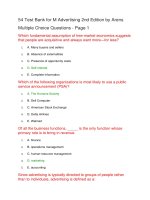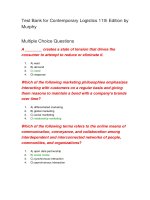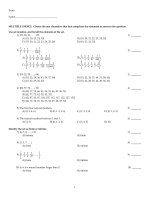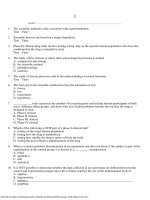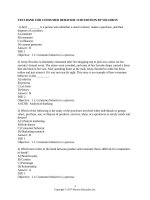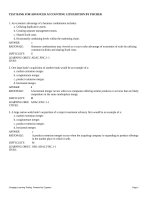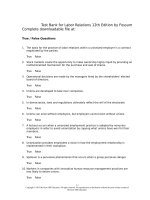Test bank for contemporary logistics 12th edition by murphy
Bạn đang xem bản rút gọn của tài liệu. Xem và tải ngay bản đầy đủ của tài liệu tại đây (61.4 KB, 13 trang )
Full file at />Test Bank for Contemporary Logistics 12th Edition by Murphy
Complete downloadable file at:
/>TEST BANK
CHAPTER 1: AN OVERVIEW OF LOGISTICS
Multiple Choice Questions (correct answers are bolded)
1. Logistics clearly contributes to ___________ and ___________ utility.
a. time; place
b. form; time
c. place; form
d. possession; time
[LO 1.1: To discuss the economic impacts of logistics; Moderate; Application; AACSB Category
3: Analytical thinking]
2. ___________ utility refers to the value or usefulness that comes from a customer being able
to take possession of a product.
a. Time
b. Place
c. Form
d. Possession
[LO 1.1: To discuss the economic impacts of logistics; Easy; Concept; AACSB Category 3:
Analytical thinking]
3. ___________ utility refers to having products available where they are needed by
customers.
a.
b.
c.
d.
Possession
Time
Place
Form
[LO 1.1: To discuss the economic impacts of logistics; Easy; Concept; AACSB Category 3:
Analytical thinking]
4. All of the following are types of economic utility except:
a. time.
b. production.
1
Copyright © 2018 Pearson Education, Inc.
Full file at />c. place.
d. possession.
[LO 1.1: To discuss the economic impacts of logistics; Moderate; Synthesis; AACSB Category
3: Analytical thinking]
5. “How well a company does what it says it’s going to do” represents ___________.
a.
b.
c.
d.
efficiency
productivity
quality
effectiveness
[LO 1.2: To define what logistics is; Easy; Concept; AASCB Category 3: Analytical thinking]
6. What concept refers to “how well company resources are used to achieve what a company
promises it can do”?
a.
b.
c.
d.
efficiency
productivity
reengineering
effectiveness
[LO 1.2: To define what logistics is; Easy; Concept; AASCB Category 3: Analytical thinking]
7. Every customer getting the same type and level of logistics service refers to ___________.
a.
b.
c.
d.
tailored logistics
mass logistics
effectiveness
efficiency
[LO 1.2: To define what logistics is; Easy; Concept; AASCB Category 3: Analytical thinking]
8. Which of the following is not a reason for the increased importance of logistics?
a.
b.
c.
d.
growing power of manufacturers
reduction in economic regulation
globalization of trade
technological advances
[LO 1.3: To analyze the increased importance of logistics; Moderate; Synthesis; AACSB
Category 3: Analytical thinking]
9.Widespread reductions in economic regulation of U.S. transportation carriers occurred in
___________.
2
Copyright © 2018 Pearson Education, Inc.
Full file at />
a. the 1960s and 1970s
b. the 1970s and 1980s
c. the 1980s and 1990s
d. only the 1990s
[LO 1:3: To analyze the increased importance of logistics; Easy; Application; AACSB Category
3: Analytical thinking]
10. The ___________ concept suggests that the customer desires a product offering that is highly
tailored to the customer’s exact preferences.
a. market demassification
b. relationship marketing
c. customized customer
d. niche marketing
[LO 1.3: To analyze the increased importance of logistics; Easy; Concept; AACSB Category 3:
Analytical thinking]
11. Approximately ___________ percent of U.S. families with children reports that both parents
work.
a. 70
b. 60
c. 50
d. 40
[LO 1.3: To analyze the increased importance of logistics; Moderate; Application; AACSB
Category 3: Analytical thinking]
12. ___________ refers to the removal of intermediaries between producer and consumer.
a. Direct channel
b. Market demassification
c. Consolidation
d. Disintermediation
[LO 1.3: To analyze the increased importance of logistics; Easy; Concept; AACSB Category 3:
Analytical thinking]
13. ___________ are stores with large amounts of both floor space and product for sale.
a. Mass merchandisers
b. Power retailers
c. Big-box retailers
3
Copyright © 2018 Pearson Education, Inc.
Full file at />d. Do-it-yourself (DIY) retailers
[LO 1.3: To analyze the increased importance of logistics; Easy; Application; AACSB Category
3: Analytical thinking]
14. An example of ___________involves ordering something online and then picking it up at a
bricks-and-mortar store.
a. supply chain management
b. finance
c. omnichannel retailing
d. big-box retailing
[LO 1.3: To analyze the increased importance of logistics; Easy; Application; AACSB Category
3: Analytical thinking]
15. World trade has grown at an average annual rate of approximately ___________ percent
since 1990.
a. 6
b. 5
c. 4
d. 3
[LO 1.3: To analyze the increased importance of logistics; Moderate; Application; AACSB
Category 3: Analytical thinking]
16. The ___________ approach indicates that a company’s objectives can be realized by
recognizing the mutual interdependence of major functional areas.
a. systems
b. supply chain
c. physical distribution
d. materials management
[LO 1.4: To discuss the systems and total cost approaches to logistics; Easy; Concept; AACSB
Category 3: Analytical thinking]
17. The movement and storage of materials into a firm refers to ___________.
a. physical distribution
b. materials management
c. supply chain management
d. materials handling
4
Copyright © 2018 Pearson Education, Inc.
Full file at />[LO 1.4: To discuss the systems and total cost approaches to logistics; Easy; Concept; AACSB
Category 3: Analytical thinking]
18. Which concept refers to the storage of finished product and movement to the customer?
a. supply chain management
b. business logistics
c. physical distribution
d. materials management
[LO 1.4: To discuss the systems and total cost approaches to logistics; Easy; Concept; AACSB
Category 3: Analytical thinking]
19. Logistics managers use the ___________ approach to coordinate materials management and
physical distribution in a cost-efficient manner.
a. total cost
b. supply chain
c. balanced
d. intrafunctional logistics
[LO 1.4: To discuss the systems and total cost approaches to logistics; Easy; Concept; AACSB
Category 3: Analytical thinking]
20. A cost trade-off is a situation where:
a. all costs react according to their individual degrees of inflation in the economy.
b. all costs are reflected as a percentage variation from standard costs.
c. some costs increase and some costs decrease.
d. some costs are eliminated by efficient management controls.
[LO 1.4: To discuss the systems and total cost approaches to logistics; Moderate; Synthesis;
AACSB Category 3: Analytical thinking]
21. The ___________ department often measures inventory in terms of its cost or value in
dollars whereas ___________ tends to measure inventory in terms of units.
a. marketing; logistics
b. finance; production
c. marketing; production
d. finance; logistics
[LO 1.5: To expose you to logistical relationships within the firm; Moderate; Application;
AACSB Category 3: Analytical thinking]
22. A common interface between production and logistics involves:
5
Copyright © 2018 Pearson Education, Inc.
Full file at />
a. the types of materials handling equipment.
b. the length of production runs.
c. the use of plastic versus wood pallets.
d. the mode of transportation.
[LO 1.5: To expose you to logistical relationships within the firm; Moderate; Application;
AACSB Category 3: Analytical thinking]
23. ___________ refers to the delay of value-added activities such as assembly, production, and
packaging to the latest possible time.
a. Building block
b. Lean manufacturing
c. Deferral
d. Postponement
[LO 1.5: To expose you to logistical relationships within the firm; Easy; Concept; AACSB
Category 3: Analytical thinking]
24. The four basic components of the marketing mix include all of the following except:
a. price.
b. production.
c. place.
d. promotion.
[LO 1.5: To expose you to logistical relationships within the firm; Easy; Concept; AACSB
Category 3: Analytical thinking]
25. Landed costs refer to:
a. the costs of a product shipped via surface transport.
b. the costs of a product that is quoted cash on delivery (COD).
c. the costs of a prepaid shipment.
d. a price that includes both the cost of the product plus transportation to the buyer.
[LO 1.5: To expose you to logistical relationships within the firm; Moderate; Concept; AACSB
Category 3: Analytical thinking]
26. ___________ refers to being out of an item at the same time there is demand for it.
a. Postponement
b. Tailored logistics
c. Stockout
d. Supplier indifference
6
Copyright © 2018 Pearson Education, Inc.
Full file at />
[LO 1.5: To expose you to logistical relationships within the firm; Easy; Concept; AACSB
Category 3: Analytical thinking]
27. Enticing customers with the promise of a low-priced product, only to find that it is
unavailable, but having a higher-priced substitute product readily available refers to
___________.
a. loss-leader marketing
b. unfair trade practices
c. bait-and-switch tactics
d. price lining
[LO 1.5: To expose you to logistical relationships within the firm; Easy; Concept; AACSB
Category 3: Analytical thinking]
28. Which of the following is not part of the marketing channel?
a. logistics channel
b. negotiations channel
c. management channel
d. finance channel
[LO 1.6: To introduce you to marketing channels; Moderate; Application; AACSB Category 3:
Analytical thinking]
29. The ownership channel consists of all parties except:
a. customers.
b. manufacturers.
c. wholesalers.
d. retailers.
[LO 1.6: To introduce you to marketing channels; Moderate; Concept; AACSB Category 3:
Analytical thinking]
30. Which channel covers the movement of title to the goods?
a. promotions
b. logistics
c. finance
d. ownership
[LO 1.6: To introduce you to marketing channels; Easy; Concept; AACSB Category 3:
Analytical thinking]
7
Copyright © 2018 Pearson Education, Inc.
Full file at />31. ___________ is bringing together similar stocks from different sources.
a. Accumulating
b. Assorting
c. Auditing
d. Allocating
[LO 1.6: To introduce you to marketing channels; Moderate; Concept; AACSB Category 3:
Analytical thinking]
32. ___________ refers to breaking a homogeneous supply into smaller lots.
a. Sorting out
b. Allocating
c. Accumulating
d. Assorting
[LO 1.6: To introduce you to marketing channels; Moderate; Concept; AACSB Category 3:
Analytical thinking]
33. Channel intermediaries:
a. assume temporary ownership of the goods.
b. tend to lack focus.
c. fill niches.
d. tend to disappear as the market becomes organized.
[LO 1.6: To introduce you to marketing channels; Moderate; Synthesis; AACSB Category 3:
Analytical thinking]
34. Brokers are intermediaries that are commonly associated with the ___________ channel.
a. promotions
b. finance
c. ownership
d. negotiation
[LO 1.6: To introduce you to marketing channels; Moderate; Concept; AACSB Category 3:
Analytical thinking]
35. The costliest logistics activity in many firms is ___________.
a. industrial packaging
b. transportation management
c. order management
d. warehousing management
8
Copyright © 2018 Pearson Education, Inc.
Full file at />
[LO 1.7: To provide a brief overview of activities in the logistics channel; Moderate;
Application; AACSB Category 3: Analytical thinking]
9
Copyright © 2018 Pearson Education, Inc.
Full file at />True-False Questions
1. Absolute and relative logistics costs in relation to gross domestic product (GDP) vary from
country to country. (True) [LO 1.1: To discuss the economic impacts of logistics; Easy;
Application; AACSB Category 3: Analytical thinking]
2. The four general types of economic utility are production, possession, time, and place. (False)
[LO 1.1: To discuss the economic impacts of logistics; Easy; Concept; AACSB Category 3:
Analytical thinking]
3. Logistics clearly contributes to time and form utility. (False) [LO 1.1: To discuss the
economic impacts of logistics; Easy; Application; AACSB Category 3: Analytical thinking]
4. The current definition of logistics, as promulgated by the Council of Supply Chain
Management Professionals (CSCMP), suggests that logistics is part of supply chain
management. (True) [LO 1.2: To define what logistics is; Easy; application; AASCB Category 3:
Analytical thinking]
5. Logistics is only concerned with forward flows—that is, those directed toward the point of
consumption. (False) [LO 1.2: Define what logistics is; Easy; Application; AASCB Category 3:
Analytical thinking]
6. The purpose of logistics is to maximize customer service. (False) [LO 1.2: To define what
logistics is; Easy; Application; AASCB Category 3: Analytical thinking]
7. In mass logistics, groups of customers with similar logistical needs and wants are provided
with logistics services appropriate to those wants and needs. (False) [LO 1.2: To define what
logistics is; Easy; Concept; AASCB Category 3: Analytical thinking]
8. Humanitarian logistics represents an emerging application of logistics to not-for-profit
organizations. (True) [LO 1.2: To define what logistics is; Easy; Application; AASCB Category
3: Analytical thinking]
9. Reductions in economic regulation allowed individual transportation companies flexibility in
pricing and service. (True) [LO 1.3: To analyze the increased importance of logistics; Easy;
Application; AACSB Category 3: Analytical thinking]
10. Market demassification suggests that the customer desires a product offering that is highly
tailored to his exact preference. (False) [LO 1.3: To analyze the increased importance of
logistics; Moderate; Concept; AACSB Category 3: Analytical thinking]
11. Disintermediation refers to the removal of intermediaries between producer and consumer.
(True) [LO 1.3: To analyze the increased importance of logistics; Easy; Concept; AACSB
Category 3: Analytical thinking]
10
Copyright © 2018 Pearson Education, Inc.
Full file at />12. Superior logistics is an essential component of corporate strategies for many big-box
retailers. (True) [LO 1.3: To analyze the increased importance of logistics; Easy; Application;
AACSB Category 3: Analytical thinking]
13. Logistics has played a minor role in the growth of global trade. (False) [LO 1.3: To analyze
the increased importance of logistics; Easy; Application; AACSB Category 3: Analytical
thinking]
14. The systems approach indicates that a company’s objectives can be realized by recognizing
the mutual interdependence of the major functional areas of a firm. (True) [LO 1.4: To discuss
the systems and total cost approaches to logistics; Easy; Concept; AACSB Category 3:
Analytical thinking]
15. A stock-keeping unit (SKU) refers to a line item of inventory offered for sale by a company.
(True) [LO 1.4: To discuss the systems and total cost approaches to logistics; Easy; Concept;
AACSB Category 3: Analytical thinking]
16. Physical distribution is synonymous with materials management. (False) [LO 1.4: To discuss
the systems and total cost approaches to logistics; Easy; Concept; AACSB Category 3:
Analytical thinking]
17. Interfunctional logistics attempts to coordinate materials management and physical
distribution in a cost-efficient manner that supports an organization’s customer service
objectives. (False)[LO 1.4: To discuss the systems and total cost approaches to logistics;
Moderate; Application; AACSB Category 3: Analytical thinking]
18. The key to the total cost approach is that all relevant cost items are considered
simultaneously when making a decision. (True) [LO 1.4: To discuss the systems and total cost
approaches to logistics; Easy; Application; AACSB Category 3: Analytical thinking]
19. The finance department tends to measure inventory in terms of units whereas logistics tends
to measure inventory in terms of its cost or value. (False) [LO 1.5: Logistical relationships
within the firm; Easy; Application; AACSB Category 3: Analytical thinking]
20. Long production runs sometimes result in excessive inventory of products with limited
demand for them. (True) [LO 1.5: To expose you to logistical relationships within the firm;
Easy; Application; AACSB Category 3: Analytical thinking]
21. Postponement is the delay of value-added activities such as assembly, production, and
packaging to the latest possible time. (True) [LO 1.5: To expose you to logistical relationships
within the firm; Easy; Concept; AACSB Category 3: Analytical thinking]
22. Logistics offers many companies an important route for creating marketing superiority.
(True) [LO 1.5: To expose you to logistical relationships within the firm; Moderate; Application;
AACSB Category 3: Analytical thinking]
11
Copyright © 2018 Pearson Education, Inc.
Full file at />23. Dual distribution refers to an alliance that allows customers to purchase products from two or
more name-brand retailers at one store location. (False) [LO 1.5: To expose you to logistical
relationships within the firm; Easy; Concept; AACSB Category 3: Analytical thinking]
24. Landed costs refer to the price of a product at its source. (False) [LO 1.5: To expose you to
logistical relationships within the firm; Easy; Concept; AACSB Category 3: Analytical thinking]
25. Stockouts refer to a situation in which a company is out of an item at the same time that there
is demand for that item. (True) [LO 1.5: To expose you to logistical relationships within the
firm; Easy; Concept; AACSB Category 3: Analytical thinking]
26. Logistical decisions tend not to be impacted by marketers’ growing emphasis on offering
sustainable products. (False) [LO 1.5: To expose you to logistical relationships within the firm;
Easy; Application; AACSB Category 3: Analytical thinking]
27. Many promotional decisions, such as pricing campaigns that lower the price of certain items,
require close coordination between marketing and logistics. (True) [LO 1.5: To expose you to
logistical relationships within the firm; Easy; Application; AACSB Category 3: Analytical
thinking]
28. The ownership channel is the one where buy and sell agreements are reached. (False) [LO
1.6: To introduce you to marketing channels; Easy; Application; AACSB Category 3: Analytical
thinking]
29. The financing channel handles a company’s credit and payment for goods. (True) [LO 1.6:
To introduce you to marketing channels; Easy; Application; AACSB Category 3: Analytical
thinking]
30. There is no link between the promotions and logistics channels. (False) [LO 1.6: To
introduce you to marketing channels; Moderate; Synthesis; AACSB Category 3: Analytical
thinking]
31. The most significant contribution that the logistics channel makes to the overall channel
process is the sorting function. (True) [LO 1.6: To introduce you to marketing channels; Hard;
Application; AACSB Category 3: Analytical thinking]
32. The sorting function has four steps. (True) [LO 1.6: To introduce you to marketing channels;
Moderate; Application; AACSB Category 3: Analytical thinking]
33. The sorting function takes place between retailers and the consumer. (False) [LO 1.6: To
introduce you to marketing channels; Easy; Application; AACSB Category 3: Analytical
thinking]
34. Intermediaries assume ownership of goods while those goods are in the marketing channel.
(False) [LO 1.6: To introduce you to marketing channels; Moderate; Application; AACSB
Category 3: Analytical thinking]
12
Copyright © 2018 Pearson Education, Inc.
Full file at />
35. A broker is a type of intermediary often associated with the negotiations channel. (True) [LO
1.6: To introduce you to marketing channels; Easy; Concept; AACSB Category 3: Analytical
thinking]
36. A commonly used logistical intermediary is the freight forwarder. (True) [LO 1.6: To
introduce you to marketing channels; Moderate; Application; AACSB Category 3: Analytical
thinking]
37. Demand forecasting is not considered to be a logistics-related activity. (False) [LO 1.7: To
provide a brief overview of activities in the logistics channel; Easy; Application; AACSB
Category 3: Analytical thinking]
38. Packaging can have both a marketing and logistical dimension. (True) [LO 1.7: To provide a
brief overview of activities in the logistics channel; Moderate; Application; AACSB Category 3:
Analytical thinking]
39. Warehousing represents the costliest logistics activity in many organizations. (False) [LO 1.7:
To provide a brief overview of activities in the logistics channel; Moderate; Application; AACSB
Category 3: Analytical thinking]
40. The job market for logisticians and supply chain managers continues to be strong at the
undergraduate, but not the MBA, level. (False) [LO 1.8: To familiarize you with logistics
careers; Easy; Application; AACSB Category 3: Analytical thinking]
13
Copyright © 2018 Pearson Education, Inc.

